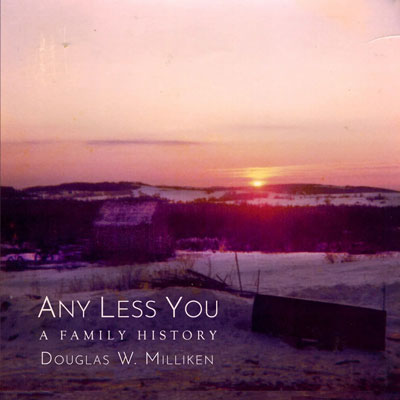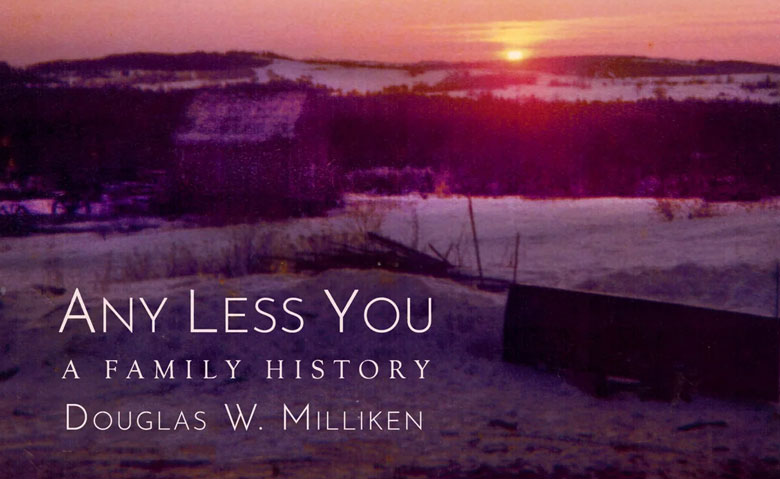Any Less You: A Family History
By Douglas Milliken; Fomite (Burlington, VT)
Novelist Douglas Milliken’s first foray into memoir, Any Less You: A Family History, opens with “evidence”: a series of family photographs he describes in detail. Responding to the feelings they provoke, Milliken provides foundational information for the discordant and painful story that follows.
We learn that Milliken’s mother and her first husband bought a farm in Aroostook County in the 1970s as part of the back-to-the-land movement. The writer’s evocation of the landscape is poetic: “a two-acre hash of tall, golden grass Xs and bends in the wind off New Brunswick’s breast.”
In a tour of the house Milliken offers memorable details, from the bottom step trapdoor where his mother hid her weed to the shellacked artist conk fungi that served as shelves for teapots. This was the place he considered most his home, “among the ghosts of this land’s previous inheritors. In the acute absence of anyone else.”
After his parents’ divorce, the photos end, “as if the camera was an accessory to a serial crime (the complicity of documentation).”
In an effort to deal with their history, Milliken wrote several personal essays which led to receiving a scholarship at the Salt Institute for Documentary Studies in Portland. The second part of the memoir revisits the interviews he conducted with his mother and father, trying again to make sense of events that took place in his past, even as he asks himself, “Is this something worth remembering?”
The second part of the memoir revisits the interviews he conducted with his mother and father, trying again to make sense of events that took place in his past…
The transcriptions of the interviews read like the script for a Eugene O’Neill play. Milliken weaves stage direction-like reflections into the dialogue, like this one about his mother: “Her laugh is a smoker’s laugh, dragged ruggedly up from her lungs like one length of slate skating unevenly over another.”
Milliken provides context for the stories and shares his responses to his parents’ answers. Pain reigns as he reviews the dynamics of their marriage, in particular the dramatic and violent ending, a harrowing fight that the author reconstructs as best he can. In the end, he declares, “I cannot write this pain away.”

Milliken’s writing is spare and clear, pensive yet direct. His account of returning to his home in East Hodgdon in the County later in life is especially moving.
“What of the Earth we could see just seemed an excuse to justify the stunning vault of the sky,” he writes of that northern Maine landscape.
Now owned by an Amish couple, the place retains some of the elements of Milliken’s youth: an unstrung clothesline, a hardy variety of magnolia he planted for his mother. He finds relief in the knowledge that the farm is in new caring hands. “This home is finally safe,” he declares.
Now a resident of Saco, Milliken has written several novels, including White Horses and Enclosure Architect, and a number of short stories, and collaborated with jeweler Cat Bates and the chamber jazz group The Plaster Cramp on special projects.
With Any Less You, he shares a back story at once brutal and beautiful, that resonates with a life lived and lost—and re-lived.
Learn more about Milliken at douglasmilliken.com.
Carl Little lives on Mount Desert Island. Among his recent books is Art of Penobscot Bay (Islandport Press), written with his brother David.





